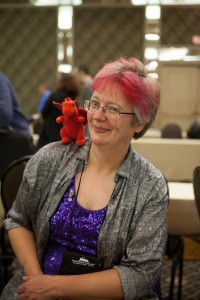
 We had the first session of the advanced workshop last night. I’m delighted by the mix, and expecting wonderful things from the class. Some are published already, some are just breaking in.
We had the first session of the advanced workshop last night. I’m delighted by the mix, and expecting wonderful things from the class. Some are published already, some are just breaking in.
Unlike the Writing Fantasy and Science Fiction Stories class, we are not focusing on one of the basics each week, like characters, plot, or world building. Instead, I am trying to let the class drive itself where it can. My hope is that everyone, by the end of class, has not just been critiqued a couple of times, but has a better sense of their writerly process and how to make it more efficient, more confidence in finishing stuff and getting it sent out, and new ways of moving story from idea to finished draft.
So here is the assignment I gave them, in the hope that it will prove useful for other writers trying to figure out their process:
Enjoy this writing advice and want more content like it? Check out the classes Cat gives via the Rambo Academy for Wayward Writers, which offers both on-demand and live online writing classes for fantasy and science fiction writers from Cat and other authors, including Ann Leckie, Seanan McGuire, Fran Wilde and other talents! All classes include three free slots.
Prefer to opt for weekly interaction, advice, opportunities to ask questions, and access to the Chez Rambo Discord community and critique group? Check out Cat’s Patreon. Or sample her writing here.
...
 The following comes from an email exchange between myself and John Barnes, whose story I critiqued and who has given permission to reprint the exchange 🙂 I know that this question often comes up for newer writers. They see writers who write long, elaborate sentences and wonder why they then get criticized for overly long and complicated sentences.
The following comes from an email exchange between myself and John Barnes, whose story I critiqued and who has given permission to reprint the exchange 🙂 I know that this question often comes up for newer writers. They see writers who write long, elaborate sentences and wonder why they then get criticized for overly long and complicated sentences.
John: When you said to work on writing on a sentence /paragraph level, were you referring to sentence structure or cutting needless words? Was it well-written? Would a good play on muscle memory to intersperse the story with flashes of memory, along the lines of what Aliette De Bodarde did with immersion?
The answer to the question in the first sentence is yes to both. I think that you are at a point in your writing where you should both be looking at constructing interesting, graceful sentences as well as making sure that you remove excess words. Extraneous language often gets in the way of a story’s speaking to a reader, muffling its impact.
I thought the language was competent, but still needs the final polish that removes any awkwardness or places where the prose calls attention to itself. One of the ways a writer convinces the reader to relax and give into the experience of the story is by convincing them they are in expert hands that will keep reminders that they are reading to a minimum. Awkward sentences or passages that are overly wordy can remind a reader that they are reading and generally are experienced as a negative rather than a positive.
Absolutely a good play on muscle memory that intersperses the story with flashes of memory would be great. To make it superlative, the language needs to be constructed as clearly as possible. If you go over “Immersion,” you will see that in every sentence, words are pulling their weight and there are no extras.
...
 The following is an expansion of a piece I wrote for a Book Smugglers roundtable.
The following is an expansion of a piece I wrote for a Book Smugglers roundtable.
Recently — or perhaps not so recently — much has been made of women writing science fiction. Often it’s coupled with a complaint about “PC” behavior stifles creativity or how leftist writing “has no new ideas.”
Hmm. Speaking as an unabashed leftist and someone lacking a penis, which may bias me somewhat, in my experience the opposite is true. I find much more interesting stuff in those who are willing to question the status quo, rather than simply write fiction using the same old stories, but this time with lasers! or infinity drives! or whatever. As Patty Jansen put it recently in her blog post, “There are girl cooties on my spaceship — on women writing hard SF,” “There are many younger readers out there who do not want their SF with sauce of sexist golden age nostalgia.”
To talk about this, though, I need to mention a book I’ve been recently reading, David Zindell’s Neverness. It’s a terrific book with some amazing writing in it. Here, for example, is a passage from page 23, which I love for its ability to seed in information about societal structures while describing a crowd:
“We received our pilot’s rings late in the afternoon of the next day. At the center of Resa, surrounded by the stone dormitories, apartments, and other buildings of the college, the immense Hall of the Ancient Pilots overflowed with the men and women of our Order. From the great arched doorway to the dais where we journeymen knelt, the brightly colored robes of the academicians and high professionals rippled like a sea of rainbow silk. Because the masters of the various professions tended to cleave to their peers, the rainbow sea was patchy: near the far pillars at the north end of the Hall stood orange-robed cetics, and next to them, a group of akashics covered from neck to ankle in yellow silk. There were cliques of scryers berobed in dazzling white, and green-robed mechanics standing close to each other, no doubt arguing as to the ultimate (and paradoxical) composition and nature of the spacetime continuum, or some other arcanum. Just below the dais was the black wavefront of the pilots and master pilots. I saw Lionel, Tomoth and his brothers, Stephen Caraghar and others that I knew. At the very front stood my mother and Justine, looking at us — I thought — proudly.”
Great stuff, yeah? And at the same time, I find the book puts me, as a female reader, in an odd position. The women in the book so far are either relatives or love interest, and their defining characteristics seem somewhat odd: the male protagonist’s mother’s defining characteristic is that she’s chubby from eating too many chocolate candies, while much is made of his aunt’s sexual rapacity.
In a novel, often the main point of view is our lens for the book. If the book were a first-person shooter game, this is the character one maneuvers through the game. Women are used to having this male perspective imposed on them; we’ve been reading those narratives ever since we started reading.
...
 Once you’ve mastered the basics of getting words on a page and moving characters around through situations, there’s some things that (in my experience) the majority of writers need to focus on. Examples are narrative grammar, paragraphing strategies, trimming excess from sentences, and getting inside a character’s head. Here, I’m going to discuss the last of those.
Once you’ve mastered the basics of getting words on a page and moving characters around through situations, there’s some things that (in my experience) the majority of writers need to focus on. Examples are narrative grammar, paragraphing strategies, trimming excess from sentences, and getting inside a character’s head. Here, I’m going to discuss the last of those.
A lot of this is taken from correspondence with my student Hasnain. He’d asked about story structures, particularly Freitag’s Triangle, and we’d discussed where the triangle occurs in Junot Diaz’s story, Fiesta 1980. In looking at his most recent story, I’d said I thought he needed to get inside his main character’s head more.
Hasnain asked: You mentioned today that going into the narrator’s head is a good thing since it helps the reader seat more firmly with the narrator. However, here’s where I am a bit confused. I read somewhere that what people think and feel should be shown in a sensory way through their actions and interactions with others. If I go into the narrator’s head, wouldn’t I be telling? In my story, this would be if the narrator thinks about how he wants to put Sal’s love to the test.
My reply:
Let’s go back to Fiesta. Here’s some places where I think we’re particularly inside the narrator’s head and seeing his thoughts.
...

And I’m really happy with it, but holy cow, is it hard to rewrite a novel. Because you’ve got to manage it all in your head while working with smaller parts of it.
I was trying to think of a comparison to make to Wayne, who is a software developer. And actually, it’s a lot like working on a large program with pretty of submodules and pieces, because when you change one section you need to figure out how it affects all the other pieces. And there’s repeated objects, or other things, and I think a little of those like global variables, so to have to make sure they’re declared before you can start using them. (As you can tell, I spent some procrastination time on thinking this out.)
Something I’m doing, which is probably rather insane of me, is that I transferred the book, which was in a Word doc, back into Scrivener. That’s because I have been severely reordering the scenes. I printed it all out, and went through that hardcopy with pen marking up some stuff and shuffling it around until it was all in the order I wanted it in.
Part of that is the process for dealing with what I’m comparing to global variables. That’s a thing that gets referenced more than once over the course of the book. Because you want it set up right the first time it appears and then for details to unfold about it in an order that makes sense and keeps building on the thing.
...
 For a couple of months now, I’ve been experimenting with using Dragon Dictate for writing, both fiction and nonfiction. In fact, I’m using it to write this post.
For a couple of months now, I’ve been experimenting with using Dragon Dictate for writing, both fiction and nonfiction. In fact, I’m using it to write this post.
It’s not perfect. I do have to go back and check what I have dictated, because errors do creep in, sometimes wonderfully funny ones (as well as the occasional expletive directed at Raven when he’s crawling on me). But, I find it is a faster way to write. It works very well when I know what it is that I want to say. For free writing, I’ll still stick with pen and paper, or sometimes the keyboard. It is, by the way, incredibly handy when you are transcribing stuff that cannot be scanned in.
It’s tons better than the dictation capability on my phone. Dragon Dictate can keep up with me as I ramble along, and doesn’t ever make me pause to let it catch up.
I absolutely HAD to finish up a story yesterday (Hi Lynne, if you’re reading this). Dragon Dictate was immense help with that, for several reasons. One, I can dictate it aloud faster than I can write. Two, I used it to transcribe the notes that I’d made in various places and go over them, expanding as I went.
Generally, once I had spent a little time working with the software, and it got a chance to refine its profile for me, I have been very satisfied with the results, inconsiderate well worth the money, if only for the productivity boost.
It is odd, however, to be dictating what I say and need to put all the punctuation in. I find myself, at times, wanting to stick the punctuation in during regular speech. It makes me speak in grammatically correct sentences, compose the words in my head before I speak them, rather than just grabbing them willy-nilly and flinging them into the sentence.
I do find writing dialogue a bit of a pain in the ass. That’s because of the need to dictate the punctuation as well as the words. But I look forward to becoming more adept with the tool, and being able to edit with voice alone as well.
Before anyone asks if it’s available on a Macintosh, I am actually using it on a Mac. Have you tried any dictation software? What have your experiences been?
...

We also spend a certain amount of time talking about slush piles and how to break out of them. Here’s a story illustrating how hard that can be to do. In light of that, some useful advice from Hugh Howey.
Fireside Magazine is taking flash submissions through May 1.
A really interesting piece talking about neuroscience in fiction, using Ted Chiang’s story “Exhalation.”
Wondering about some of the gender breakdowns in publishing from last year? Here’s coverage of women on f/sf blogs in 2012. Read Renay’s piece talking about the project first. She also mentions a book I highly, highly recommend, How to Suppress Women’s Writing, by Joanna Russ. I found that book in college and it really shaped my thinking.
A Tumblr blog of paying markets, primarily non-fiction.
Another resource, listing writing contests, grants, and awards, from Poets and Writers.
...
These are noteworthy writing or publishing related links I’ve found recently:
Writing Links
Publishing Links
...
 Here is the only thing I know to be true about writing advice: none of it is 100% true. There are always exceptions, always idiosyncrasies of individual process.
Here is the only thing I know to be true about writing advice: none of it is 100% true. There are always exceptions, always idiosyncrasies of individual process.
Here is the smartest piece of writing advice I ever got: said by Syne Mitchell while I was at Clarion West in 2005, “Try different things, find what works for you, and do that. Lots.”
Writers should pay attention to our own process. Sometimes we’re reluctant to do so. We worry that like the centipede in the story who stops being able to walk after thinking about exactly how she does it, looking at our own process will damage or kill it. A Schrödinger’s cat: we know we’re doing something, but if we look to prove that, it’ll vanish.
This is not actually true. Looking will, most probably, not kill it. If you are the rare exception that cannot look at their process without damaging it, a brief examination will let you know this without damaging anything too much. Maybe. There are no guarantees in writing advice.
But if you are part of the vast majority that WILL learn from it, what will you gain?
...

The key points were:
Enjoy this writing advice and want more content like it? Check out the classes Cat gives via the Rambo Academy for Wayward Writers, which offers both on-demand and live online writing classes for fantasy and science fiction writers from Cat and other authors, including Ann Leckie, Seanan McGuire, Fran Wilde and other talents! All classes include three free slots.
Prefer to opt for weekly interaction, advice, opportunities to ask questions, and access to the Chez Rambo Discord community and critique group? Check out Cat’s Patreon. Or sample her writing here.
...
Want access to a lively community of writers and readers, free writing classes, co-working sessions, special speakers, weekly writing games, random pictures and MORE for as little as $2? Check out Cat’s Patreon campaign.

"(On the writing F&SF workshop) Wanted to crow and say thanks: the first story I wrote after taking your class was my very first sale. Coincidence? nah….thanks so much."

(science fiction, flash fiction) When Bjorn and his fellows were selected to supply context for the alien overlords who kept insisting they were just there for the Earth’s own protection, he’d expected something different.


This site is protected by reCAPTCHA and the Google Privacy Policy and Terms of Service apply. This site is a participant in the Amazon Services LLC Associates Program, an affiliate advertising program designed to provide a means for sites to earn advertising fees by advertising and linking to Amazon.com.